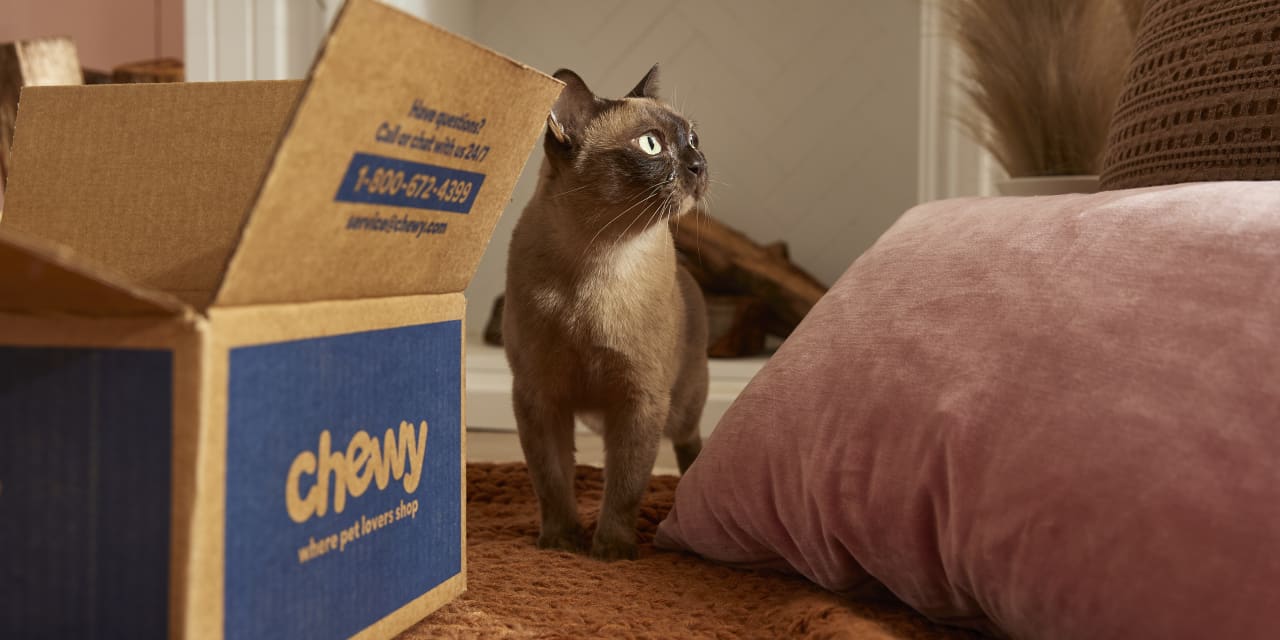Pet supplies and trips to the vet aren’t getting any cheaper. But as higher prices raise questions about the impact on demand, analysts at Jefferies said online retailer Chewy Inc. and pet-medication distributor PetIQ Inc. were best positioned for the more cautious backdrop, thanks to wealthier customers and a more proactive approach to pet health.
The analysts, led by Kaumil Gajrawala, started coverage of both stocks with buy ratings, with a price target of $27 for Chewy
CHWY,
and $22 for PetIQ
PETQ,
Chewy’s stock jumped 8.4% on Tuesday. Shares of PetIQ gained 4%.
The Jefferies analysts made their calls as pet owners navigate higher costs for pet food and pet care, with the industry overall consolidating and passing expenses from higher employee wages along to customers. Some consumers have sought more affordable options for pet food as a result.
But the analysts said Chewy “appears insulated” from those issues, because its customers tend to have more money and also tend to have recurring orders shipped automatically.
“High inflation is causing trade down in food and discretionary is still weak,” the analysts said in a research note dated Monday. “Chewy indexes to high income groups, ~76% of sales are from Autoship customers, and consumables, not supplies, make up the lion’s share of sales (70%).”
The analysts said Chewy’s online market share has held at around 36% to 37% over the past 18 months, calling that a sign the company is maturing. But they said future areas of growth for the company — like pet health, in-house products, advertising and new markets — were still in their early days.
The analysts said that PetIQ, which distributes pet medications and makes its own flea and tick treatments, is “benefiting from pet owners increasingly adopting a preventative medication & supplement routine.”
They noted: “Usage of flea, tick, and heartworm meds has increased, yet less than 30% of dog owners engage with these products, suggesting a long runway remains.”
However, they said, the biggest gains — and margins — lie in PetIQ’s in-house brands, including its medications, supplements, treats and stain and odor cleaners, with products like those making up 30% of the company’s product sales. Lower prices on those in-house brands, and an appetite for mergers and acquisitions, could also help shore up demand and financials, they said.
Elsewhere, the analysts were a little less enthusiastic. They started coverage of pet-supplies retailer Petco Health and Wellness Co., pet-food maker Freshpet Inc. and Bark Inc., which sells things like dog toys and accessories online, with hold ratings.
For Petco
WOOF,
the analysts said the chain faces a slowdown in discretionary spending, uncertainty surrounding its decisions to add veterinary care to stores and to reintroduce cheaper brands, and competition from online and mass-market retailers. Petco last month reported an unexpected quarterly loss and slashed its full-year outlook amid what it said was a “challenging consumer environment.“
Freshpet
FRPT,
the analysts said, had benefited from a broader shift toward more premium pet-food offerings. But they said the company faced questions about whether it could make enough food to meet demand, due to production constraints that could take time to address and limit sales and profit gains. Still, Freshpet last month offered a more upbeat full-year sales outlook.
The analysts said Bark was trying to steer through a sharp drop in demand for things like dog toys after the pandemic’s pet-spending and adoption boom gave way to a spike in prices for basics last year that reshaped shoppers’ spending habits. The company, they said, had begun focusing more on selling things like food, treats and vitamins and selling through other retailers. But the analysts said more work remained.
“The strategic moves and signs of profitability are encouraging, but the industry is facing a tough consumer backdrop, so everything is harder,” they said. “When done right, business transformations take time.”
Read the full article here




